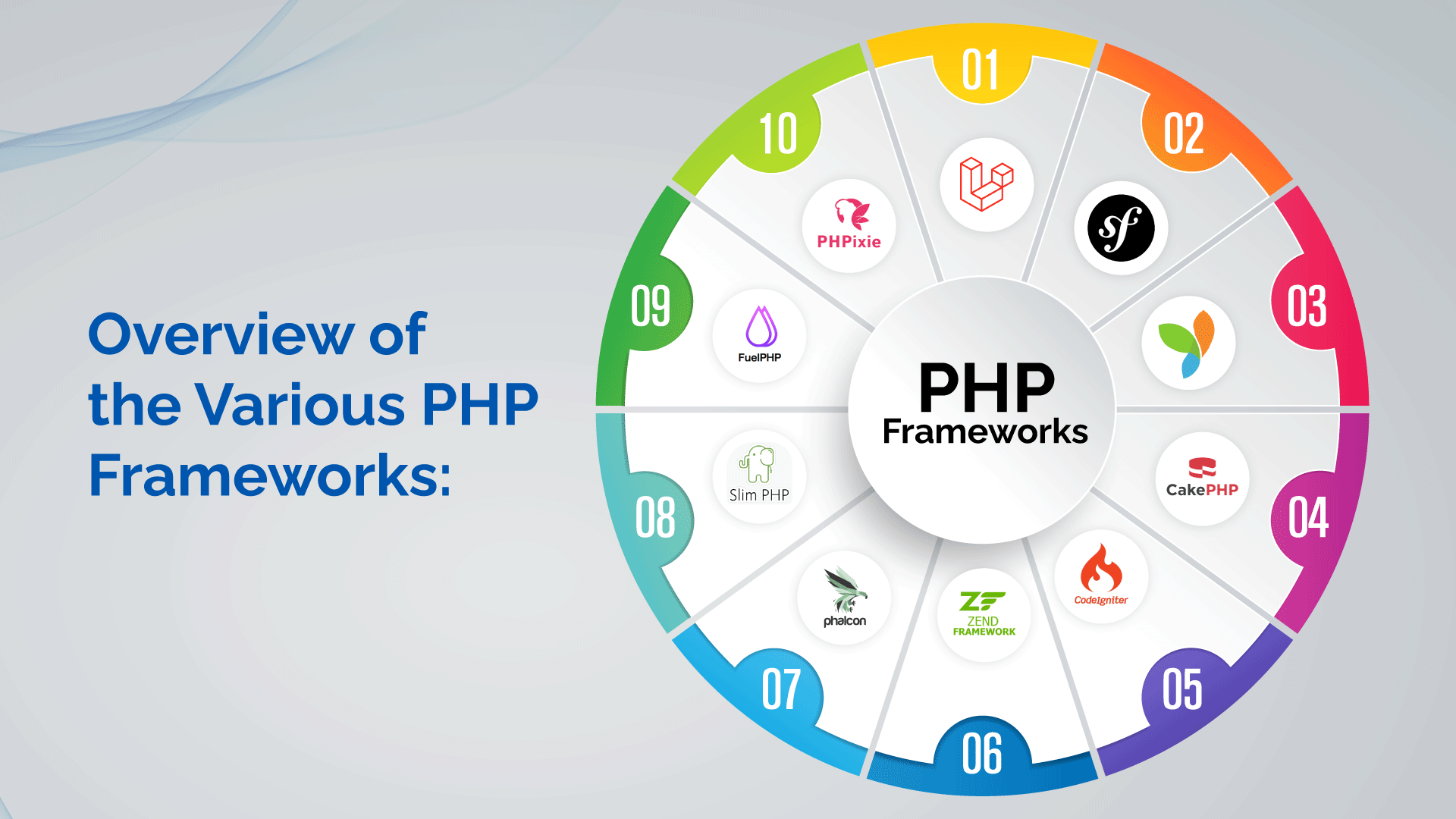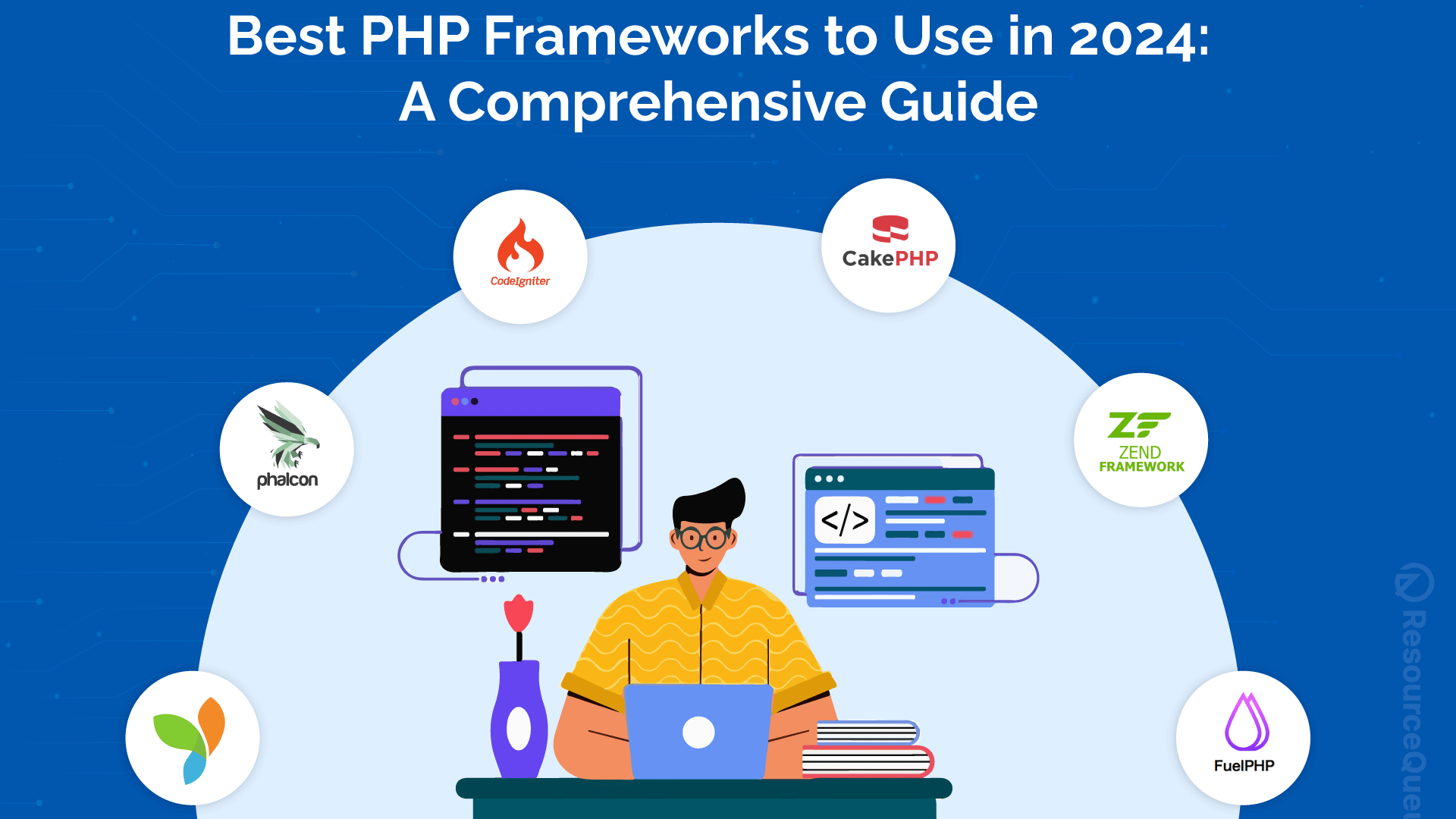With new technologies, trends, and tools changing every day, it can be difficult to pick the right framework for your project. To make matters more complex, there are many different options and patterns available for developers. This comprehensive guide will explore a few of the best PHP frameworks so you can determine which one is best suited to meet your development needs this year. We'll explore various features such as performance optimization, routing systems, and error-handling abilities - helping you find the perfect solution for a successful app or website. In addition to looking at each framework's strengths and weaknesses with insight from expert software engineers, we'll also provide some helpful tips on getting started that will save time during implementation. By delving into these subjects thoroughly, this article aims to simplify the process of creating an efficient application like never before!
Overview of the Various PHP Frameworks

PHP is now widely used in web application development, making it a top choice among programming languages. PHP's success can be attributed to the wide range of frameworks available. Each PHP framework comes with its unique set of features, which makes it easier for developers to build robust web applications.
The most popular PHP frameworks are CodeIgniter, Laravel, Yii2, Zend, and Symphony. Laravel is known for being beginner-friendly and has an excellent documentation system. On the contrary, CodeIgniter is lightweight and simple to pick up.. Yii2 is known for being a fast framework and has built-in support for AJAX-enabled widgets.
Symfony offers reusable components, whereas Zend excels in developing enterprise-level applications. It is crucial to comprehend the distinctive features and advantages of each framework when choosing the ideal one for your project. Now, let's delve into these frameworks and examine them in-depth.
Laravel
Laravel is widely acclaimed as a top choice among open-source web frameworks for developing web applications. With its straightforward syntax, rich features, and active community backing, it remains a top pick among developers. One of its pros is the built-in authentication system that makes it easy to manage user sessions and access. Additionally, it has powerful routing capabilities and supports a variety of databases, making it a versatile choice.
On the flip side, Laravel can be resource-intensive and requires a steeper learning curve than some other frameworks. Additionally, some developers may find the reliance on third-party packages to be a drawback. Despite these cons, Laravel remains a strong contender in the world of web development, with many developers praising its flexibility and rich functionality.
Symfony
Symfony presents a robust PHP framework with a mix of advantages and disadvantages. On the positive side, it boasts thorough documentation, ease of learning, and high customizability. Symfony aids in saving time and effort for programmers through its provision of pre-built modules and libraries, freeing up developers to concentrate on the unique aspects of their projects. Additionally, it offers advanced capabilities such as dependency injection, caching systems, and robust security features.
Nonetheless, a potential drawback of Symfony lies in its steep learning curve, which could pose a challenge for newcomers. Additionally, the framework can be somewhat slower than other options, making it less than ideal for high-performance applications or projects with tight time constraints. Despite these drawbacks, Symfony remains a top choice for web programmers looking for a flexible, comprehensive solution.
Yii 2
Yii 2 is a modern and scalable PHP framework with a wide range of features. It's designed to accelerate the development process and simplify coding procedures. On the positive side, Yii 2 offers an extensive extension library, integrated testing tools, and a robust security system.
These features can help developers save time and boost the efficiency of the development process. Yet, it presents a steep learning curve, which may pose a challenge for newcomers to grasp and master. Also, its documentation may not be as comprehensive as that of similar frameworks. Despite its challenges, Yii 2 is an excellent choice for developers who need high-performance and scalable web applications.
CakePHP
CakePHP stands out as a widely-used PHP web application framework with a decade-long legacy. Like any tech tool, it comes with its set of pros and cons. One of the standout benefits of CakePHP is its ability to speed up development time, thanks to its built-in CRUD (Create, Read, Update, Delete) functionality and scaffolding. This enables developers to focus on more complex and business-specific features of the application.
Additionally, CakePHP has a strong community of users and contributors, which allows for a wealth of resources and support. However, some potential drawbacks of CakePHP may include its relatively steep learning curve for new developers and its strict coding conventions, which may limit freedom and flexibility. Overall, CakePHP is a dependable and powerful framework that can provide significant value to those willing to invest time in mastering it.
CodeIgniter
If you are looking for a PHP framework that is lightweight and user-friendly, CodeIgniter might just be the perfect choice. One of the biggest advantages of CodeIgniter is its low learning curve, which makes it an ideal option for beginners. In addition to its simplicity, CodeIgniter offers high levels of customization, empowering developers to effortlessly adjust and expand its functionalities.
On the downside, CodeIgniter isn't the most scalable framework out there, which may pose some limitations for larger projects. Additionally, its lack of a strict structure could lead to inconsistent coding practices if not handled carefully. However, if you're looking for a quick and efficient option for smaller projects, CodeIgniter is definitely worth considering.
Zend Framework
Zend Framework is a powerful and feature-rich open-source framework that is highly popular among developers. It is designed to simplify the creation of complex web applications and provides a wide range of tools and utilities that streamline the development process.
One of the biggest benefits of Zend Framework is its modular architecture, which enables developers to choose only the components that they need and discard the rest. This approach makes for a leaner and more efficient application, which can save businesses time and money.
The framework also boasts excellent security features, including input filtering, output encoding, and secure password hashing. In general, Zend Framework proves to be an excellent option for creating sturdy, scalable, and secure web applications.
Phalcon
Phalcon is an open-source PHP web framework designed to speed up the building of web applications by providing low-level access to key features. What sets Phalcon apart from other popular PHP frameworks is its ability to execute compiled C-extensions, making it incredibly fast and efficient. By utilizing C-extensions, Phalcon can handle more requests per second than traditional PHP frameworks, leading to faster load times and a better overall user experience.
Additionally, Phalcon offers a range of benefits, such as advanced caching capabilities, support for multiple database systems, easy-to-use CLI tools, and a modular architecture that facilitates the separation of concerns and promotes code reuse. Overall, Phalcon is an excellent choice for developers looking to create high-performance web applications with minimal overhead and maximum productivity.
Slim Framework
If you're looking for a lightweight and efficient framework to develop web applications, Slim Framework might be just what you need. With its minimalistic design, Slim is a go-to choice for developers seeking simplicity and flexibility. Don't let its size fool you, though, as Slim is still equipped with all the necessary features to build robust and scalable web applications.
Slim offers a hassle-free setup, allowing you to dive into building immediately without the burden of intricate configurations. One of Slim's most significant benefits includes its ability to enhance your web application's performance, thanks to its lightweight and optimized codebase. Whether you're a beginner or a seasoned programmer, Slim Framework's user-friendly interface and extensive documentation make it a great choice for your next web project.
FuelPHP
FuelPHP is a remarkable web application framework that helps developers create complex applications with ease. It's a PHP framework that combines the best features of other popular PHP frameworks to offer an extensive range of benefits. FuelPHP is flexible, modular, and scalable, which allows developers to create high-performance web applications that meet the changing needs of their clients. With its straightforward syntax, extensive libraries, and user-friendly features, it stands out as an exceptional option for novices and seasoned developers alike.
In addition to its remarkable features, FuelPHP provides numerous benefits such as increased productivity, enhanced security, and seamless integration with other technologies. Overall, FuelPHP stands out as a compelling option for developers seeking to build web applications that prioritize speed, security, and ease of maintenance.
PHPPixie
PHPPixie is an open-source PHP web application framework designed to make web development easy, fast, and efficient. With its robust features and powerful functionalities, PHPPixie empowers developers to build large-scale applications that are reliable, scalable, and easy to maintain. Some of the key benefits of using PHPPixie include its flexibility, compatibility with different databases, lightweight footprint, and intuitive API.
PHPPixie also offers excellent documentation which makes it easy to learn and use. With its active community and frequent updates, PHPPixie is a great choice for developers who want to streamline their web development processes and build high-quality web applications in a short amount of time.
Conclusion
After exploring the key features, pros, and cons of several popular PHP web frameworks like Laravel, Symfony, Yii 2, CakePHP, CodeIgniter, Zend Framework, Phalcon, Slim Framework, and FuelPHP, it is clear that each brings its own strengths and weaknesses to the table. Ultimately you need to choose the option that will best meet your individual requirements; what works for one person may not work for another. Thinking about your level of expertise in back-end programming as well as what type of coding experience you prefer should aid in making your decision.
So, whether you need a simple solution or something more complex and robust for creating dynamic applications, with some diligent research any user can select the ideal PHP framework for their project.


